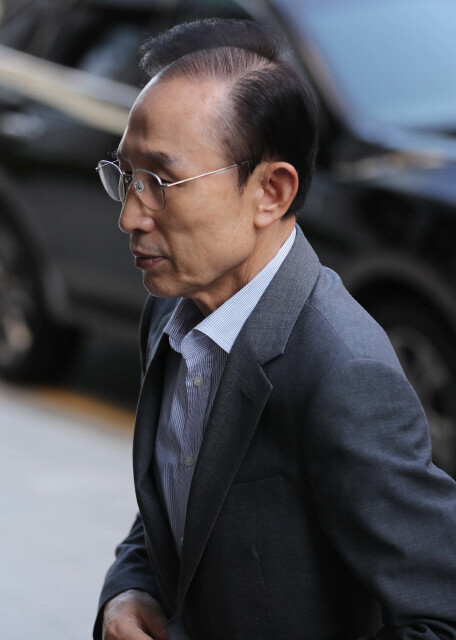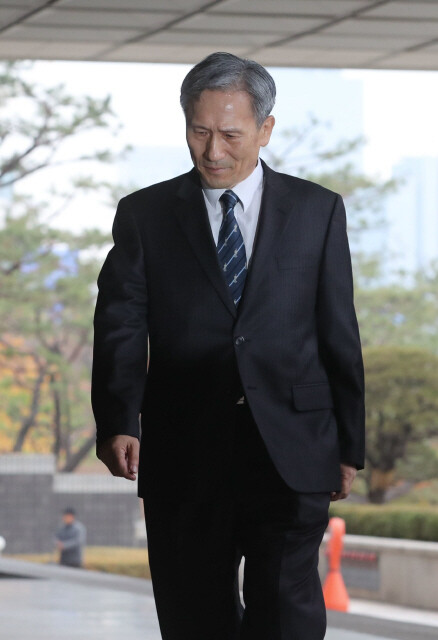hankyoreh
Links to other country sites 다른 나라 사이트 링크
Prosecutor’s investigative net closing around Lee Myung-bak

As investigations into political meddling by the military Cyber Command and the National Intelligence Service during the administration of former South Korean President Lee Myung-bak pick up speed, the net appears to be closing around Lee.
The investigation that is moving forward the most quickly is the one into allegations about online comment operations run by the military’s Cyber Command. Now that the prosecutors have requested a detention warrant for former Defense Minister Kim Kwan-jin, 68, on Nov. 8, the clock is ticking for Lee, who was giving orders and being briefed on the Cyber Command’s operations, to be called in for questioning.
The primary charges against Kim are using the military agency to interfere in politics by ordering Yeon Je-uk, then-Cyber Commander and an active-duty soldier at the time, to carry out activities supporting the ruling party and criticizing the opposition leading up to the general election and the presidential election in 2012. That would be a flagrant violation of Article 5 of the South Korean Constitution, which requires the military to remain politically neutral.
Article 94 of the Military Criminal Code also states that soldiers who use their position to get involved in politics, such as by expressing opinions favoring or opposing particular parties or politicians, will be sentenced to no more than five years in prison. Soldiers’ duty of political neutrality was emphasized in addition to the political neutrality of public servants in light of South Korea’s disturbing history of politically motivated soldiers taking over the government, but this principle was essentially broken during the Lee administration.
Importantly, Kim Kwan-jin reportedly testified to the prosecutors during questioning that “Lee Myung-bak was briefed about the activities of the Cyber Command and about the hiring of additional staff. After receiving the president’s orders, Blue House Senior Secretary for National Security Strategy Kim Tae-hyo (vice minister in rank) generally carried out working-level meetings.” This is driving suspicions that the main culprit behind the Cyber Command’s political involvement, including its comment operations, was the Blue House, and ultimately Lee himself.
Evidence shows Lee’s deep involvement
The prosecutors have also acquired a variety of documents that show Lee’s involvement. A document titled “Results of BH [Blue House] Cooperative Meeting on Cyber Command” that was composed by the Cyber Command and signed by Kim Kwan-jin on Mar. 10, 2013, states that the Cyber Command hired more civilian employees on the president’s orders. This section of the document stands as circumstantial evidence that not only the Blue House but also Lee himself were briefed on these matters.
The prosecutors’ other investigations are gradually closing in on Lee. The prosecutors believe that Lee was ultimately responsible for the NIS’s political commenting operations, for which former NIS director Won Sei-hoon, 66, has already been jailed and is now being tried. Since Won was a close associate of Lee who regularly had private meetings with him, Lee was likely briefed on related matters.
Documents from the NIS’s Reform and Development Committee show that the Lee administration started running a civilian team of commenters in 2009, after the 2008 candlelight rallies [against the importation of US beef] convinced it of the importance of the “battle for public opinion.” Thirty external teams of cyber commenters were set up and operated between 2009 and 2012 on Won’s orders, and Won was briefed on documents aimed at damaging Seoul Mayor Park Won-soon. The prosecutors have already called Won in for questioning, and they have jailed Yu Seong-ok and Min Byeong-ju, former leaders of the NIS’s psychological operations division, who ran the teams of commenters.
Under the Lee administration, the NIS also created a “blacklist” consisting of 82 politically problematic individuals from five fields in Feb. 2009 and used this list to intimidate and sideline these people. This was part of efforts to limit the impact of popular figures and organizations in the culture and arts. Evidence that the Blue House took direct steps to ostracize these artists and culture figures has even been confirmed in Blue House documents. The prosecutors suspect that such actions occurred under orders from Lee. They are also considering whether Lee was involved in a case in which the NIS put pressure on chaebols to fund conservative organizations.
BKK scandal is ticking time bombAnother ticking time bomb is an investigation into claims that Lee was involved in DAS’s recovery of an investment of 14 billion won (US$12.48 million) from an investment consulting firm called BBK. (DAS is an automobile part supplier whose president is Lee’s older brother Lee Sang-eun.) This case has been assigned to the first division of the high-tech crimes department at the Seoul Central District Prosecutors’ Office, which is under the command of a senior prosecutor named Shin Bong-su. Shin, it turns out, is familiar with the basic facts of the case, given his involvement in a special prosecutors’ investigation into BBK in 2008. The prosecutors have been moving forward with the case, and on Oct. 30 they called in the person who filed the complaint (the president of Optional Capital, whose surname is Jang) for questioning.
The crux of the case is that Lee allegedly mobilized the Foreign Ministry and other government agencies to help BBK investor DAS pocket 14 billion won before the victims (composed of minority stockholders) could recover the money that Kim Kyoung-joon, former BBK president, had embezzled through civil litigation. This was part of the BBK scandal, in which Kim manipulated stock prices at Optional Ventures in 2001. Reports in the press have already revealed that Kim Jae-su, who was then South Korea’s consul general in Los Angeles, was present at a meeting designed to deal with DAS. The prosecutors are planning to confirm whether Lee actually exercised his authority to have diplomats meddle in this dispute between individual companies over assets.
The prosecutors are also planning to investigate allegations that Lee was the de facto owner of DAS. There has been considerable speculation on Internet message boards and social media about who controls DAS. “We will determine the legal owner [of DAS],” said Yun Seok-yeol, head of the Seoul Central District Prosecutors’ Office, during the parliamentary audit on Oct. 23.
Lee and allies unable to hide discomfort with investigationsLee and his allies have been unable to hide their discomfort with the prosecutors’ multi-pronged investigations. During a meeting with his chief associates at the beginning of this month, Lee reportedly said it is “unfortunate that the country keeps being hobbled by the past.” Lee also wrote on his Facebook page on Sept. 28 that the current administration’s anti-corruption investigations were “regressive attempts” that “will not only harm the national interest but will ultimately be unsuccessful.” Lee will be heading to the Middle East on Nov. 12 to deliver a lecture, and it remains to be seen what statement he will make at the airport.
The prosecutors have displayed a cautious attitude about whether they will question Lee, noting “things should be done in order.” But the prevailing view in and around the prosecutors is that Lee being questioned in person is a fait accompli.
“It’s just a matter of when and how. Judging from how the investigation is proceeding, investigators appear to have Lee’s prosecution in mind,” said a former senior prosecutor who is now working as a lawyer.
By Kim Yang-jin, staff reporter
Please direct questions or comments to [english@hani.co.kr]

Editorial・opinion
![[Guest essay] The real reason Korea’s new right wants to dub Rhee a founding father [Guest essay] The real reason Korea’s new right wants to dub Rhee a founding father](https://flexible.img.hani.co.kr/flexible/normal/500/300/imgdb/original/2024/0423/8317138574257878.jpg) [Guest essay] The real reason Korea’s new right wants to dub Rhee a founding father
[Guest essay] The real reason Korea’s new right wants to dub Rhee a founding father![[Column] ‘Choson’: Is it time we start referring to N. Korea in its own terms? [Column] ‘Choson’: Is it time we start referring to N. Korea in its own terms?](https://flexible.img.hani.co.kr/flexible/normal/500/300/imgdb/original/2024/0423/3617138579390322.jpg) [Column] ‘Choson’: Is it time we start referring to N. Korea in its own terms?
[Column] ‘Choson’: Is it time we start referring to N. Korea in its own terms?- [Editorial] Japan’s rewriting of history with Korea has gone too far
- [Column] The president’s questionable capacity for dialogue
- [Column] Are chaebol firms just pizza pies for families to divvy up as they please?
- [Column] Has Korea, too, crossed the Rubicon on China?
- [Correspondent’s column] In Japan’s alliance with US, echoes of its past alliances with UK
- [Editorial] Does Yoon think the Korean public is wrong?
- [Editorial] As it bolsters its alliance with US, Japan must be accountable for past
- [Guest essay] Amending the Constitution is Yoon’s key to leaving office in public’s good graces
Most viewed articles
- 1Samsung barricades office as unionized workers strike for better conditions
- 2[Editorial] Japan’s rewriting of history with Korea has gone too far
- 3[Column] The president’s questionable capacity for dialogue
- 4[Reporter’s notebook] Did playing favorites with US, Japan fail to earn Yoon a G7 summit invite?
- 5[Column] The clock is ticking for Korea’s first lady
- 6Korean government’s compromise plan for medical reform swiftly rejected by doctors
- 7[Column] Are chaebol firms just pizza pies for families to divvy up as they please?
- 8Why Korea shouldn’t welcome Japan’s newly beefed up defense cooperation with US
- 9[Column] Has Korea, too, crossed the Rubicon on China?
- 10US overtakes China as Korea’s top export market, prompting trade sanction jitters